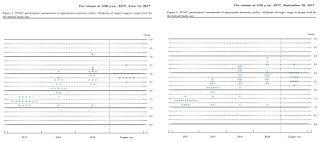| Last | Change | |
| S&P Futures | 2506.8 | -1.0 |
| Eurostoxx Index | 386.5 | 0.1 |
| Oil (WTI) | 51.6 | 0.1 |
| US dollar index | 86.3 | 0.0 |
| 10 Year Govt Bond Yield | 2.31% | |
| Current Coupon Fannie Mae TBA | 103.05 | |
| Current Coupon Ginnie Mae TBA | 103.98 | |
| 30 Year Fixed Rate Mortgage | 3.88 |
Stocks are flattish on no real news. Bonds and MBS are flat as well.
Personal Incomes rose 0.2%, right in line with estimates. The prior month was revised downward to 0.2%. The increase in personal incomes largely came from increased rental income, transfer payments, and interest income, not wages and salaries. Consumer spending rose 0.1%, while all of the inflation numbers came in a touch light. Weak auto sales drove the low consumer spending number. The personal savings rate was 3.6%. It probably won't affect any of the Fed's thinking with respect to a December hike, however the declining annual PCE inflation will concern some of the doves at the FOMC, as will the lack of wage growth. Note that these numbers will have some effects of the TX and FL hurricanes, and BEA is unable to separate them out.
The Chicago Purchasing Manager Index bounced back in September, hitting 65.2, way above expectations. While several regions have been reporting strength, Chicago has been an outlier.
Consumer sentiment slipped slightly in September, showing only a modest impact of the hurricanes, according to the University of Michigan survey.
Donald Trump reportedly met with Kevin Warsh to discuss the Federal Reserve Chairman position. The choice will probably end up either Warsh or Yellen.
Tax reform could be a big boost for the financial sector, especially banks. Since banks generally have fewer deductions than other businesses, a drop in the tax rate disproportionately benefits them. Note that lowering rates will create issues with pass-through small businesses, and could be subject to abuse. Note that the Admin is already softening its stance on state and local tax deductions, which has always been a tough one politically. Given the probability that no Democrats will support tax reform (at least at the individual level), a few blue state Republicans could sink it.
Most renters would like to own a home someday, however the up-front costs are the biggest obstacle. Renters need to be educated more on FHA loans, which are designed specifically to get the first time homebuyer into a home with a minimum down payment.
An improving economy means less payday loans. I wonder how much of this has been due to the CFPB too.









